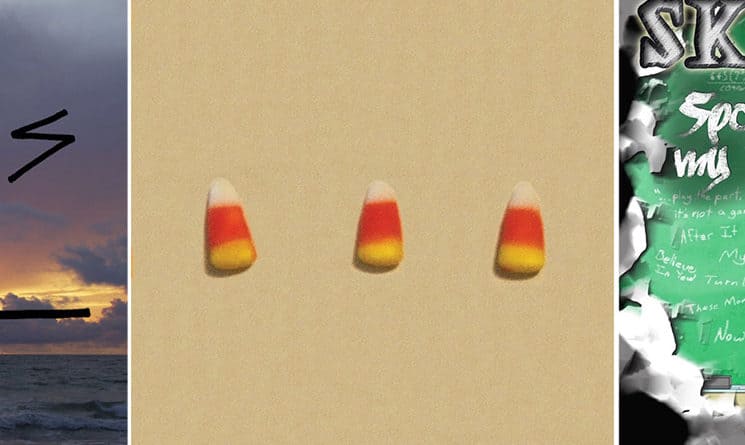“Bones” by The Ghosts of Electricity
Spark & Fizz Records
File Under: atmospheric, avant-pop, experimental
It’s fitting that the dreamy music and surrealist lyrical poetry that comprises “Bones” were inspired by one of frontman Ray McNamara’s dreams. As the comic book-ish liner notes explain, in McNamara’s dream, he chatted with Tom Waits and heard a “kitchen orchestra.” The vision stuck with him, and he was determined to start work on an experimental album.
The Ghosts of Electricity is a side-project for McNamara, who plays lead guitar in Afrobeat group Big Mean Sound Machine. It’s been four years since The Ghosts of Electricity have had a release, and the new six-song EP features Radiohead-like sound collages that layer to make extradimensional atmospheric textures.
Tracks like “Retrospect I,” “Retrospect II,” and “The Anthropophage” have moments that could very well be the background music for a David Lynch movie, with abstract tones that are borderline industrial. Yet one of the album’s most unconventional moments happens in the eponymous track, when McNamara samples the sounds of car parts and bones to accompany his lyrics about, well, wearing bones in his hair and rattling fistfuls of car parts.
From there, McNamara’s hallucinogenic words bubble up through the EP in strange ways. Hearing McNamara’s droning voice on songs like “The Question,” where he repeats, “Cosmos or consciousness? / Which inside the other / Cosmos or consciousness / Verity or consequence?,” is both soothing and likely to trigger agoraphobia.
McNamara’s haunting singing style reflects religious chanting on occasion, and in songs like “The Great Tower,” the lyrics become explicitly spiritual. The creeping melodies, which sound as though they’re being played backwards, are like an unexpected religious experience, comforting and creepy. As a result, “Bones” moves beyond being a simple EP and becomes a true experience.
“Charles” by Charles
Midnight Werewolf Records
File Under: indie rock, emo, pop punk, metal
The spotlight on emo began to dim at the beginning of the decade, and the genre has gone back to its roots, so much so that fans are welcoming an “emo revival.” It’s a return to the DIY aesthetic, a move away from commercialized emo pop like All Time Low and Boys Like Girls and a return to early bands like Texas Is The Reason and The Promise Ring.
Charles is on track to be one of the emo revival’s feature players. The core appeal of their self-titled EP is diversity. Charles’ three songwriters each bring something different to the record. Bassist Ezra Cohen’s “Rude” is a pop song cloaked in distortion and grit. Complete with a catchy chorus and some Beach Boys-style harmonies, it calls back to the power punk of early Weezer. “Boy” and “No Blood,” written by guitarist Connor Sheridan, toe the line of metal and post-hardcore. Echoes of Rites of Spring come during the song’s destructive choruses. Guitarist Dante Guzzardi closes out the EP with his two songs, “Hot Wax” and “I Lost My.” The mathy, clean guitar riffs sliding along the foundation of drummer Cody Tresback’s calculated rhythms will hit home for fans of indie emo bands like American Football.
“Spot For My Name” by Skee
Self-released
File Under: conscious hip-hop, backspin
By day, Aaron Ward is a math teacher at Oyster River Middle School in Durham. But by night, he’s Skee, a hip-hop artist who embraces his role as a teacher through his rhymes. Skee’s been making music for years, but it’s only recently that he’s gotten attention outside the Seacoast hip-hop scene, thanks in large part to a recent feature on “New Hampshire Chronicle.”
Conscious hip-hop — made famous by artists like KRS-One, Jedi Mind Tricks, and Immortal Technique — focuses on awareness of social injustice rather than rap bravado. It’s a genre that exposes problems, but doesn’t necessarily offer a positive outlook or solutions.
Skee brings all that with him on “Spot For My Name.” Themes about growing older (“Backspin”), dealing with insecurity (“Fall and Rise”), and embracing personal acceptance (“Believe in You”) are told through multisyllabic rhymes and unique, personal storytelling. Working with an array of local and national producers and beat-makers, Skee calculates his brand of socially conscious lyrics over the rhythm as though they’re equations — the logic tight and the conclusions inescapable. As the album’s artwork and synth-heavy production suggest, “Spot For My Name” blends modern hip-hop with sounds from the genre’s golden age in the 1980s and 1990s. On the album, Skee offers a nice throwback to the old school while looking ahead. Hopefully, he has plenty more lessons to teach.

